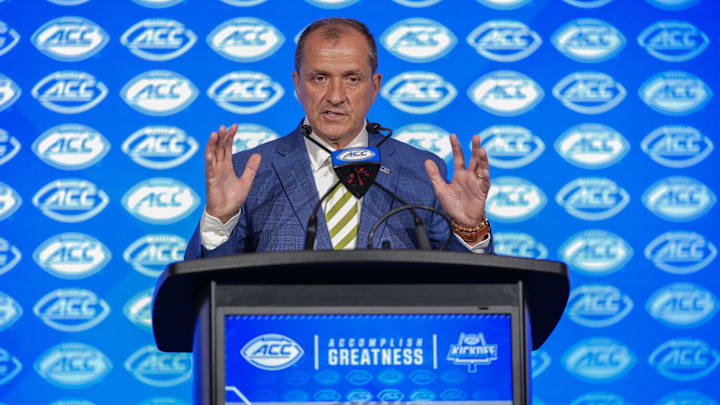With the amount of money that schools are throwing around now in recruiting and in the Transfer Portal, creative solutions are going to continue to be found to generate more revenue for conferences.
Every bit of legislation that is brought forward to "cap" spending or add guardrails has been, and will continue to be, met with lawsuits and pushback.
Sports betting partnerships seem to be a logical next step for conferences to make. According to ACC commissioner Jim Phillips at last week's ACC Media Days, his league has at least glanced across the table at potential sports betting partnerships.
"We've looked at it from a little bit of a distance," Phillips said. "But I think we have to be really serious, and we have to be diligent and thoughtful in any process there. But yeah, it's like any category: You look at where you may be able to monetize your operation."
The ACC is joining the SEC and Big Ten this season in forcing member institutions to provide injury reports several times a week. Some might believe that information is valuable to the opponent; it's even more valuable for gamblers, particularly the professional variety who make their living every Saturday.
Sports betting parternships are inevitable, but it's a slippery slope
You can't turn on your television to a sports channel nowadays without being bombarded with gambling ads. And this is not an anti-gambling post in the slightest; I dabble myself from time to time. But there is a major hypocrisy going on in sports right now that leagues consistently accept advertising dollars from gambling websites and then are appalled that the advertising works on the players in their leagues.
Sports betting has exploded in the United States since 2018, when the Supreme Court struck down the Professional and Amateur Sports Protection Act of 1992. You no longer have to fly to Vegas or Atlantic City or find a shady bookie who might break your legs if you're a day or two late with a payment in order to place a wager on a game.
Now, in most states, you can place a bet legally from your phone without getting off your couch. The enterprise is much safer and secure than it used to be, but it has also led to plenty of controversial moments in sports in the last seven years.
Guys like Jontay Porter were actively shaving points and got banned from the NBA. Alabama's baseball coach got fired for being linked to suspicious betting activity. Numerous NFL players have been suspended for placing bets, many of which weren't even on NFL games. ESPN has a timeline if you are interested in learning more.
Sports betting isn't going away. It's ingrained into the fabric of watching and enjoying the games for many Americans now. And it's only a matter of time before collegiate conferences find ways to further monetize it.
